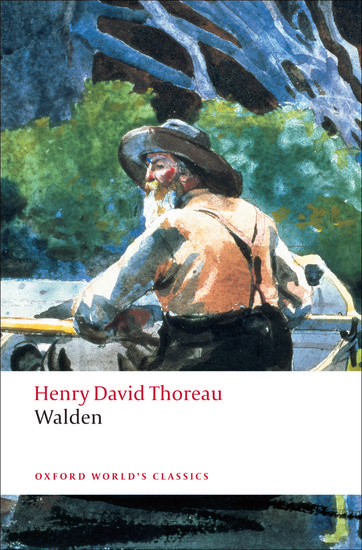
In 1845 Henry David Thoreau left his home town of Concord, Massachusetts to begin a new life alone, in a rough hut he built himself a mile and a half away on the north-west shore of Walden Pond. Walden is Thoreau’s classic autobiographical account of this experiment in solitary living, his refusal to play by the rules of hard work and the accumulation of wealth and above all the freedom it gave him to adapt his living to the natural world around him.
The mass of men lead lives of quiet desperation. What is called resignation is confirmed desperation. From the desperate city you go into the desperate country, and have to console yourself with the bravery of minks and muskrats. A stereotyped but unconscious despair is concealed even under what are called the games and amusements of mankind. There is no play in them, for this comes after work. But it is a characteristic of wisdom not to do desperate things.
When we consider what, to use the words of the catechism, is the chief end of man, and what are the true necessaries and means of life, it appears as if men had deliberately chosen the common mode of living because they preferred it to any other. Yet they honestly think there is no choice left. But alert and healthy natures remember that the sun rose clear. It is never too late to give up our prejudices. No way of thinking or doing, however ancient, can be trusted without proof. What every body echoes or in silence passes by as true to-day may turn out to be falsehood to-morrow, mere smoke of opinion, which some had trusted for a cloud that would sprinkle fertilizing rain on their fields. What old people say you cannot do you try and find that you can. Old deeds for old people, and new deeds for new. Old people did not know enough once, perchance, to fetch fresh fuel to keep the fire a-going; new people put a little dry wood under a pot, and are whirled round the globe with the speed of birds, in a way to kill old people, as the phrase is. Age is no better, hardly so well, qualified for an instructor as youth, for it has not profited so much as it has lost. One may almost doubt if the wisest man has learned any thing of absolute value by living. Practically, the old have no very important advice to give the young, their own experience has been so partial, and their lives have been such miserable failures, for private reasons, as they must believe; and it may be that they have some faith left which belies that experience, and they are only less young than they were. I have lived some thirty years on this planet, and I have yet to hear the first syllable of valuable or even earnest advice from my seniors. They have told me nothing, and probably cannot tell me any thing, to the purpose. Here is life, an experiment to a great extent untried by me; but it does not avail me that they have tried it. If I have any experience which I think valuable, I am sure to reflect that this my Mentors said nothing about.
Edited with an Introduction and Notes by Stephen Fender, Professor of American Studies and Director of the Postgraduate Centre in the Humanities, University of Sussex, this new edition of Walden considers the author in the context of his birthplace and his sense of its history: social, economic and natural. In addition, an ecological appendix provides modern identifications of the myriad plants and animals to which Thoreau gave increasingly close attention as he became acclimatized to his life in the woods by Walden Pond.
For over 100 years Oxford World’s Classics has made available the broadest spectrum of literature from around the globe. Each affordable volume reflects Oxford’s commitment to scholarship, providing the most accurate text plus a wealth of other valuable features, including expert introductions by leading authorities, voluminous notes to clarify the text, up-to-date bibliographies for further study, and much more.
Subscribe to the OUPblog via email or RSS.
Subscribe to only philosophy articles on the OUPblog via email or RSS.



Recent Comments
There are currently no comments.